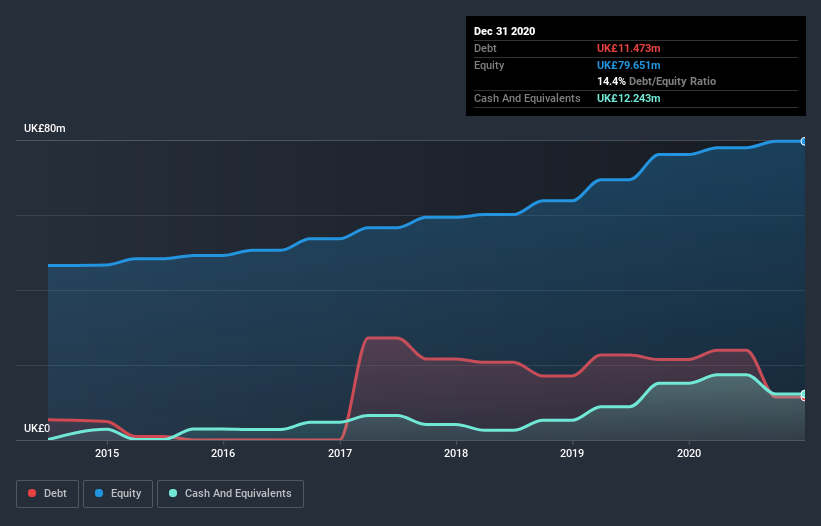We Think Michelmersh Brick Holdings (LON:MBH) Can Stay On Top Of Its Debt
Warren Buffett famously said, 'Volatility is far from synonymous with risk.' So it seems the smart money knows that debt - which is usually involved in bankruptcies - is a very important factor, when you assess how risky a company is. We can see that Michelmersh Brick Holdings plc (LON:MBH) does use debt in its business. But should shareholders be worried about its use of debt?
What Risk Does Debt Bring?
Debt and other liabilities become risky for a business when it cannot easily fulfill those obligations, either with free cash flow or by raising capital at an attractive price. Ultimately, if the company can't fulfill its legal obligations to repay debt, shareholders could walk away with nothing. However, a more usual (but still expensive) situation is where a company must dilute shareholders at a cheap share price simply to get debt under control. By replacing dilution, though, debt can be an extremely good tool for businesses that need capital to invest in growth at high rates of return. The first step when considering a company's debt levels is to consider its cash and debt together.
View our latest analysis for Michelmersh Brick Holdings
What Is Michelmersh Brick Holdings's Net Debt?
As you can see below, Michelmersh Brick Holdings had UK£11.5m of debt at December 2020, down from UK£21.5m a year prior. But on the other hand it also has UK£12.2m in cash, leading to a UK£770.0k net cash position.
A Look At Michelmersh Brick Holdings' Liabilities
The latest balance sheet data shows that Michelmersh Brick Holdings had liabilities of UK£13.8m due within a year, and liabilities of UK£22.4m falling due after that. On the other hand, it had cash of UK£12.2m and UK£9.84m worth of receivables due within a year. So its liabilities total UK£14.1m more than the combination of its cash and short-term receivables.
Since publicly traded Michelmersh Brick Holdings shares are worth a total of UK£136.2m, it seems unlikely that this level of liabilities would be a major threat. However, we do think it is worth keeping an eye on its balance sheet strength, as it may change over time. Despite its noteworthy liabilities, Michelmersh Brick Holdings boasts net cash, so it's fair to say it does not have a heavy debt load!
But the bad news is that Michelmersh Brick Holdings has seen its EBIT plunge 16% in the last twelve months. If that rate of decline in earnings continues, the company could find itself in a tight spot. There's no doubt that we learn most about debt from the balance sheet. But it is future earnings, more than anything, that will determine Michelmersh Brick Holdings's ability to maintain a healthy balance sheet going forward. So if you're focused on the future you can check out this free report showing analyst profit forecasts.
Finally, a business needs free cash flow to pay off debt; accounting profits just don't cut it. Michelmersh Brick Holdings may have net cash on the balance sheet, but it is still interesting to look at how well the business converts its earnings before interest and tax (EBIT) to free cash flow, because that will influence both its need for, and its capacity to manage debt. Over the last three years, Michelmersh Brick Holdings actually produced more free cash flow than EBIT. That sort of strong cash conversion gets us as excited as the crowd when the beat drops at a Daft Punk concert.
Summing up
Although Michelmersh Brick Holdings's balance sheet isn't particularly strong, due to the total liabilities, it is clearly positive to see that it has net cash of UK£770.0k. The cherry on top was that in converted 119% of that EBIT to free cash flow, bringing in UK£9.1m. So we don't have any problem with Michelmersh Brick Holdings's use of debt. When analysing debt levels, the balance sheet is the obvious place to start. But ultimately, every company can contain risks that exist outside of the balance sheet. Case in point: We've spotted 2 warning signs for Michelmersh Brick Holdings you should be aware of.
If, after all that, you're more interested in a fast growing company with a rock-solid balance sheet, then check out our list of net cash growth stocks without delay.
This article by Simply Wall St is general in nature. It does not constitute a recommendation to buy or sell any stock, and does not take account of your objectives, or your financial situation. We aim to bring you long-term focused analysis driven by fundamental data. Note that our analysis may not factor in the latest price-sensitive company announcements or qualitative material. Simply Wall St has no position in any stocks mentioned.
Have feedback on this article? Concerned about the content? Get in touch with us directly. Alternatively, email editorial-team (at) simplywallst.com.

 Yahoo Finance
Yahoo Finance 
